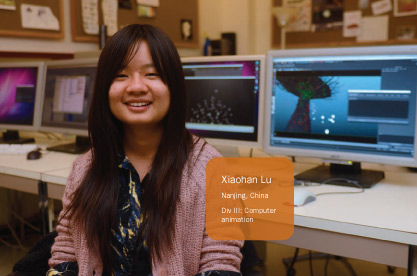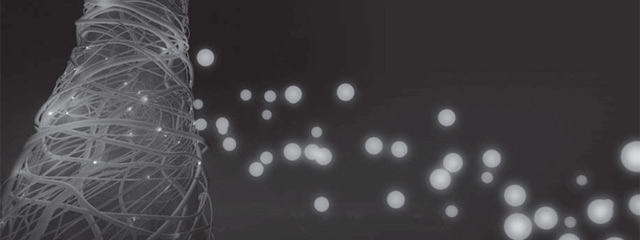THE SEMESTER’S END is just a few days away, and Christopher Bishop’s Animation Workshop students have settled in for a screening of their newly completed films. As the lights are dimmed, they look both excited and exhausted, an understandable mix at this time of year.
Bishop is familiar with that look. He graduated from Hampshire in 2004, so it wasn’t long ago that the visiting assistant professor of computer animation was in a similar situation. Filling in for media arts and sciences professor Chris Perry while the latter is on sabbatical, Bishop was at first apprehensive that students would be wary of a young alum as their replacement for the popular Perry. But he believes now that the atmosphere of collaboration so embedded in the College’s philosophy made it an easy obstacle to overcome.
“I really feel privileged to have been asked to teach these courses,” he says. “The cliché is that you don’t fully learn something until you teach it, and that’s been true for me.”
Bishop has taught several animation classes at Hampshire in the past few years, including co-teaching Computer Animation I with Perry in 2006.
Bishop “has always had artistic talent and a real drive to produce challenging, critical work,” says Perry. “He’s gotten to a point where he has a really good handle on how to do this himself, and he can now share it with others. This is valuable for the students. I think they’re really lucky to be working with him.”
After graduating, Bishop continued to work closely with Perry through Bit Films. Perry started the computer animation incubator program, essentially Hampshire’s own animation studio, to give students experience working in an environment similar to those of major studios such as Pixar (where Perry was a technical director and programmer before teaching at Hampshire). Instead of one person making an entire film on her or his own, tasks are broken down depending on the skills of everyone involved.
Bishop and fellow alum Evan Viera spent three years with the Bit Films crew making the 11-minute animated short Caldera, which premiered at the SXSW Film Festival in 2012 and won the Prix Ars Electronica Award of Distinction and Best Animated Film at the Rome International Film Festival. The latest film through Bit Films is Tube; Bishop serves as animation director and several of his Animation Workshop students are involved as well.
Watch Caldera:
For Xiaohan Lu , working with Bishop in classes and on Tube reinforced her decision to transfer to Hampshire after beginning her studies in Nanjing, China. “Chris Bishop is like a friend. We can talk about anything. Most Hampshire professors are like that,” she says.
Xiaohan had planned to focus on film production, but after auditing Bishop’s Computer Animation I, she was drawn in. His Animating Characters course made her even more committed to the field.
 “I found it really interesting to do animation,” she says. “Animating Characters was more like a film or art class. You would learn how you felt about the character you were animating.”
“I found it really interesting to do animation,” she says. “Animating Characters was more like a film or art class. You would learn how you felt about the character you were animating.”
Another student taking Bishop’s class and working on Tube is Jake Wisdom. He says he’s enjoyed the experience of working on a production that will probably screen at numerous film festivals around the world, but he also liked creating his own world: that, essentially, is what he did for his class project. His plans for it, however, had to be scaled back a bit.
“I had crazy effects in mind, and I had to trim that. I think it ended up being more of an experimental animation than what I’d intended,” says Wisdom, “but I enjoyed what I learned from it. It was a great experience.”
That sort of hard-earned knowledge is what Bishop intended with Animation Workshop. “It teaches students how to propose reasonable learning and production goals. But there’s so much autonomy,” he says. The autonomy promotes “a perpetual feedback loop of collaboration and inspiration.”
That feedback comes from varied backgrounds, too. The great thing about Hampshire’s animation program, Bishop believes, is that it attracts students from across academic disciplines.
Elisabeth Rosenthal’s project was an animated film showcasing cell biology because she’s interested in that field. She first tried to capture measurements from a variety of scientific papers by duplicating them in the 3-D modeling program Maya, but, she says, it ended up being “kind of stiff.” She then found better working information in the Worldwide Protein Data Bank, imported the basic information into Maya, and modeled her animation on top of that.
Merrick Moore-Fields took inspiration from ghost stories his grandparents told him when he was younger, using them to create a fictional West Virginia ghost town.
Ian Lewis Slammon created an up-to-date version of old-fashioned stop-motion animation, with a variety of characters, from a stuffed teddy bear to a Claymation-like zombie. “I built a series of stop-motion models and then did a series of animation tests with each model,” he says. “The trick was to make them flexible enough to articulate and balanced enough to stay in position.”
Bishop finds himself returning to that sort of hands-on creation after years of being involved in three-dimensional computer animating. His latest project, tentatively titled The Zanesville Massacre, will be a 2D short based on the death of 48 exotic animals in Ohio in 2011. It’s a film fueled by his growing desire to do more experimental work rooted in social criticism. He sees it as an opportunity to incorporate journalistic techniques in a grittier artistic style.
“I’m finding more and more that the expressiveness of traditional tools are pulling me back in,” he says. “I want it to have that human error and a tactile and visceral quality that comes with a hand holding a drawing tool and putting it to a surface.”
Many students are enlisting in Bishop’s production team, which enables him make use of their academic strengths while they learn from him and accumulate experience in professional independent work.
“I look at the natural evolution of an artist as eventually teaching,” says Bishop. “I’m glad I’m getting this experience now.”
Hampshire College Animation Demo Reel:
Media Contact
All media inquires should be directed to Elaine Thomas, Director of College Communications, at communications@hampshire.edu or 413.559.5482.






I was looking at your website, because a friend’s daughter was accepted for the fall. I was curious about the school and discovered your animation demo reel. I loved seeing the different techniques that were included on the reel. If any of your students or faculty are interested in offering private tutoring, I’d like to encourage them to sign up on NextGuru.com. (We offer free membership) We have a category for filmmaking under Art.